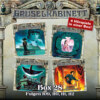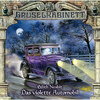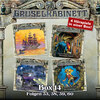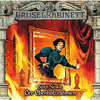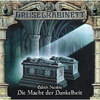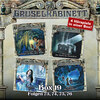Buch lesen: «Harding's luck», Seite 13
CHAPTER XII
THE END
What a triumph for little lame Dickie of Deptford!
You think, perhaps, that he was happy as well as proud, for proud he certainly was, with those words and those cheers ringing in his ears. He had just done the best he could, and tried to help Beale and the dogs, and the man who had thought himself to be Lord Arden had said, "I am proud that he should be the head of our house," and all the Arden folk had cheered. It was worth having lived for.
The unselfish kindness and affection of the man he had displaced, the love of his little cousins, the devotion of Beale, the fact that he was Lord of Arden, and would soon be lord of all the old acres – the knowledge that now he would learn all he chose to learn and hold in his hand some day the destinies of these village folk, all loyal to the name of Arden, the thought of all that he could be and do – all these things, you think, should have made him happy.
They would have made him happy, but for one thing. All this was won at the expense of those whom he loved best – the children who were his dear cousins and playfellows, the man, their father, who had moved heaven and earth to establish Dickie's claim to the title, and had been content quietly to stand aside and give up title, castle, lands, and treasure to the little cripple from Deptford.
Dickie thought of that, and almost only of that, in the days that followed.
The life he had led in that dream-world, when James the First was King, seemed to him now a very little thing compared with the present glory, of being the head of the house of Arden, of being the Providence, the loving over-lord of all these good peasant folk, who loved his name.
Yet the thought of those days when he was plain Richard Arden, son of Sir Richard Arden, living in the beautiful house at Deptford, fretted at all his joy in his present state. That, and the thought of all he owed to him who had been Lord of Arden until he came, with his lame foot and his heirship, fretted his soul as rust frets steel. These people had received him, loved him, been kind to him when he was only a tramp boy. And he was repaying them by taking away from them priceless possessions. For so he esteemed the lordship of Arden and the old lands and the old Castle.
Suppose he gave them up – the priceless possessions? Suppose he went away to that sure retreat that was still left him – the past? It was a sacrifice. To give up the here and now, for the far off, the almost forgotten. All that happy other life, that had once held all for which he cared, seemed thin and dream-like beside the vivid glories of the life here, now. Yet he remembered how once that life, in King James's time, had seemed the best thing in the world, and how he had chosen to come back from it, to help a helpless middle-aged ne'er-do-weel of a tramp – Beale. Well, he had helped Beale. He had done what he set out to do. For Beale's sake he had given up the beautiful life for the sordid life. And Beale was a new man, a man that Dickie had made. Surely now he could give up one beautiful life for another – for the sake of these, his flesh and blood, who had so readily, so kindly, so generously set him in the place that had been theirs?
More and more it came home to Dickie that this was what he had to do. To go back to the times when James the First was King, and never to return to these times at all. It would be very bitter – it would be like leaving home never to return. It was exile. Well, was Richard Lord Arden to be afraid of exile – or of anything else? He must not just disappear either, or they would search and search for him, and never know that he was gone forever. He must slip away, and let the father of Edred and Elfrida be, as he had been, Lord Arden. He must make it appear that he, Richard Lord Arden, was dead. He thought over this very carefully. But if he seemed to be dead, Edred and Elfrida would be very unhappy. Well, they should not be unhappy. He would tell them. And then they would know that he had behaved well, and as an Arden should. Don't be hard on him for longing for just this "little human praise." There are very few of us who can do without it; who can bear not to let some one, very near and dear, know that we have behaved rather decently on those occasions when that is what we have done.
It took Dickie a long time to think out all this, clearly, and with no mistakes. But at last his mind was made up.
And then he asked Edred and Elfrida to come up to the cave with him, because he had something to tell them. When they were all there, sitting on the smooth sand by the underground stream, Dickie said —
"Look here. I'm not going on being Lord Arden."
"You can't help it," said Edred.
"Yes, I can. You know how I went and lived in King James's time. Well, I'm going there again – for good."
"You shan't," said Elfrida. "I'll tell father."
"I've thought of all that," Dickie said, "and I'm going to ask the Mouldiwarps to make it so that you can't tell. I can't stay here and feel that I'm turning you and your father out. And think what Edred did for me, in this very cave. No, my mind's made up."
It was, and they could not shake it.
"But we shan't ever see you again."
Dickie admitted that this was so.
"And oh, Dickie," said Elfrida, with deep concern, "you won't ever see us again either. Think of that. Whatever will you do without us?"
"That," said Dickie, "won't be so bad as you think. The Elfrida and Edred who live in those times are as like you as two pins. No, they aren't really! Oh, don't make it any harder. I've got to do it."
There was that in his voice which silenced and convinced them. They felt that he had, indeed, to do it.
"I could never be happy here – never," he went on; "but I shall be happy there. And you'll never forget me, though there are one or two things I want you to forget. And I'm going now."
"Oh, not now; wait and think," Elfrida implored.
"I've thought of nothing else for a month," said Dickie, and began to lay out the moon-seeds on the smooth sand.
"Now," he said, when the pattern was complete, "I shall hold Tinkler and the white seal in my hand and take them with me. When I've gone, you can put the moon-seeds in your pocket and go home. When they ask you where I am, say I am in the cave. They will come and find my clothes, and they'll think I was bathing and got drowned."
"I can't bear it," said Elfrida, bursting into sobs. "I can't, and I won't."
"I shan't be really dead, silly," Richard told her. "We're bound to meet again some day. People who love each other can't help meeting again. Old nurse told me so, and she knows everything. Good-bye, Elfrida." He kissed her. "Good-bye, Edred, old chap. I'd like to kiss you too, if you don't mind. I know boys don't, but in the times I'm going to men kiss each other. Raleigh and Drake did, you know."
The boys kissed shyly and awkwardly.
"And now, good-bye," said Richard, and stepped inside the crossed triangles of moon-seeds.
"I wish," he said slowly, "oh, dear Mouldiwarps of Arden, grant me these last wishes. I wish Edred and Elfrida may never be able to tell what I have done. And I wish that in a year they may forget what I have done, and let them not be unhappy about me, because I shall be very happy. I know I shall," he added doubtfully, and paused.
"Oh, Dickie, don't," the other children cried out together. He went on —
"I wish my uncle may restore the Castle, and take care of the poor people so that there aren't any poor people, and every one's comfortable, just as I meant to do."
He took off his cap and coat and flung them outside the circle, his boots too.
"I wish I may go back to James the First's time, and live out my life there, and do honor in my life and death to the house of Arden."
The children blinked. Dickie and Tinkler and the white seal were gone, and only the empty ring of moon-seeds lay on the sand.
"Shocking bathing fatality," the newspapers said. "Lord Arden drowned. The body not yet recovered."
It never was recovered, of course. Elfrida and Edred said nothing. No wonder, their elders said. The shock was too great and too sudden.
The father of Edred and Elfrida is Lord Arden now. He has done all that Dickie would have done. He has made Arden the happiest and most prosperous village in England, and the stream beside which Dickie bade farewell to his cousins flows, a broad moat round the waters of the Castle, restored now to all its own splendor.
There is a tablet in the church which tells of the death by drowning of Richard, Sixteenth Lord Arden. The children read it every Sunday for a year, and knew that it did not tell the truth. But by the time the moon-seeds had grown and flowered and shed their seeds in the Castle garden they ceased to know this, and talked often, sadly and fondly, of dear cousin Dickie who was drowned. And at the same time they ceased to remember that they had ever been out of their own time into the past, so that if they were to read this book they would think it all nonsense and make-up, and not in the least recognize the story as their own.
But whatever else is forgotten, Dickie is remembered. And he who gave up his life here for the sake of those he loved will live as long as life shall beat in the hearts of those who loved him.
And Dickie himself. I see him in his ruff and cloak, with his little sword by his side, living out the life he has chosen in the old England when James the First was King. I see him growing in grace and favor, versed in book learning, expert in all noble sports and exercises. For Dickie is not lame now.
I see the roots of his being taking fast hold of his chosen life, and the life that he renounced receding, receding till he can hardly see it any more.
I see him, a tall youth, straight and strong, lending the old nurse his arm to walk in the trim, beautiful garden at Deptford. And I hear him say —
"When I was a little boy, nurse, I had mighty strange dreams – of another life than this."
"Forget them," she says; "dreams go to the making of all proper men. But now thou art a man; forget the dreams of thy childhood, and play the man to the glory of God and of the house of Arden. And let thy dreams be of the life to come, compared to which all lives on earth are only dreams. And in that life all those who have loved shall meet and be together forevermore, in that life when all the dear and noble dreams of the earthly life shall at last and forever be something more than dreams."











